Overview
To effectively lose 20 lb of fat, individuals must establish a caloric deficit by consuming fewer calories than they expend. This process should be complemented by regular physical activity and a balanced diet that is rich in whole foods. Furthermore, it is crucial to maintain this caloric deficit while understanding the metabolic and hormonal factors that influence weight loss. Sustainable weight loss is supported by guidelines that recommend a strategic combination of dietary adjustments and exercise to achieve the desired results.
Introduction
In the quest for effective fat loss, understanding the intricate balance between caloric intake, exercise, and mindset is crucial. As individuals navigate their weight loss journeys, they encounter a myriad of strategies and principles that can either propel them forward or hinder their progress.
From the importance of maintaining a caloric deficit to the role of nutritious foods and regular physical activity, the path to sustainable weight management is multifaceted. This article delves into essential components of fat loss, offering insights into:
- Effective dietary strategies
- The significance of exercise
- The power of a positive mindset
All while highlighting the support available through personalized coaching and corporate wellness programs. By embracing these principles, individuals can cultivate healthier habits and achieve their weight loss goals, ultimately leading to improved overall well-being.
Understanding the Fundamentals of Fat Loss
Fat reduction occurs when the body taps into its stored fat reserves for energy, a process primarily driven by maintaining a caloric deficit. This deficit is achieved by consuming fewer calories than the body expends, which is essential for effective management of body mass. Key elements affecting fat reduction comprise metabolism, hormonal balance, and lifestyle decisions, all of which play a significant role in shaping an individual's journey to achieve a healthier body.
To create a successful loss plan, it is crucial to understand these elements. Begin by evaluating your current mass, body composition, and lifestyle habits to identify areas for enhancement. Keeping a food diary can be an invaluable tool, allowing you to track your caloric intake and gain insights into your eating patterns.
Current guidelines recommend that adults engage in 150 to 300 minutes of moderate-intensity exercise or 75 to 150 minutes of vigorous-intensity exercise weekly. This degree of physical activity not only aids in reducing body mass but also improves overall wellness and vitality. Foresight Health Coaching offers tailored fitness coaching and wellness workshops that can help individuals meet these activity guidelines, ensuring a structured approach to physical fitness.
Research indicates that creating a caloric deficit of approximately 500 calories per day can lead to a sustainable reduction of 20 lb of fat over time, averaging 1 to 2 pounds per week. This approach helps avoid health issues related to insufficient nutrient intake while promoting a balanced diet rich in nutritious foods and regular physical activity. The case study titled "Calorie Deficit for Reducing Mass" emphasizes the significance of maintaining a daily calorie deficit to help achieve the reduction of 20 lb of fat.
Expert opinions emphasize the significance of hormonal balance in reducing fat. Nutritionists, including Gavin Van De Walle, emphasize that understanding how metabolism interacts with hormonal levels can significantly affect results in reducing body mass. Van De Walle observes, "You can determine your maintenance calories in several different methods," which highlights the significance of understanding your caloric requirements for effective management.
Real-world examples of successful fat reduction programs often illustrate the effectiveness of combining dietary changes with consistent exercise to achieve a loss of 20 lb of fat. Case studies demonstrate that individuals who embrace a systematic method for caloric deficit and physical activity not only reach their weight reduction objectives but also enjoy enhanced energy levels and overall well-being. Foresight Health Coaching's personalized coaching services, delivered through an innovative app, provide ongoing support and accountability, making it easier for individuals to implement these changes.
In addition to individual coaching, Foresight Health Coaching offers corporate memberships designed to foster a healthy workplace environment. These memberships include in-person wellness talks, comprehensive pantry and nutrition services, and access to our health and wellness app, enhancing connectivity and support among employees. By investing in corporate wellness programs, organizations can cultivate a healthier, more cohesive team culture.
In summary, achieving fat reduction requires a multifaceted approach that includes understanding caloric needs, engaging in regular physical activity, and maintaining hormonal balance. By concentrating on these fundamentals, individuals can establish a sustainable route toward their fitness objectives. Furthermore, Foresight Health Coaching's partnership provides organizations with an opportunity to reinforce the benefits of physical activity and wellness programs in the workplace.
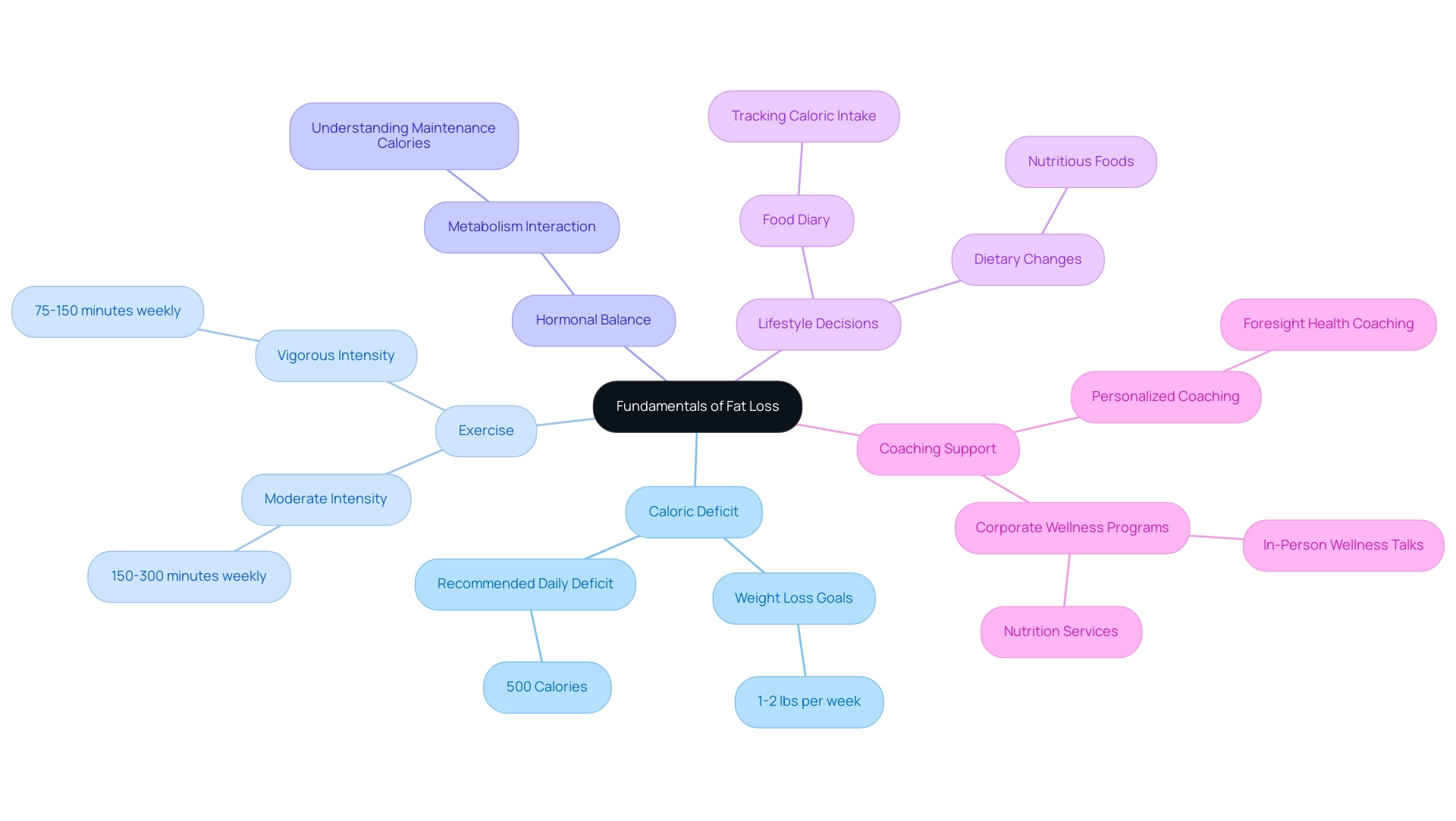
The Importance of Caloric Deficit in Weight Loss
Establishing a caloric deficit is crucial for successful weight loss, which involves consuming fewer calories than your Total Daily Energy Expenditure (TDEE). To begin, compute your TDEE using an online calculator that considers your age, mass, height, and activity level. This figure represents the total calories your body requires to sustain its current mass, factoring in both resting metabolic rate (approximately 1540 kcal/day) and physical activity.
It's important to note that TDEE can fluctuate based on changes in diet, physical activity, and body composition; thus, regular monitoring is essential.
For optimal weight loss, aim for a caloric deficit of 500 to 1000 calories per day, which can help you lose approximately 20 lb of fat over time at a rate of 1 to 2 pounds per week. Achieving this deficit can be accomplished through a combination of dietary adjustments and increased physical activity. Incorporating regular physical activity not only enhances your caloric burn but also improves job performance, creativity, and stress management.
Research indicates that employees who engage in physical activity produce higher quality work and exhibit better concentration and decision-making skills. A case study titled "Impact of Exercise on Job Performance" supports this, showing that organizations implementing exercise programs can expect increased motivation, reduced fatigue, and improved cognitive function among employees.
Consistently track your progress and be prepared to modify your caloric consumption as needed to stay aligned with your reduction objectives. Current studies indicate that maintaining a consistent caloric deficit is essential for sustainable body mass reduction, as many individuals can effectively lose 20 lb of fat with an average caloric deficit of around 500 calories per day in 2025. By understanding and implementing these principles, you can successfully navigate your weight loss journey and achieve your desired outcomes.
Remember, as Steve says, "You can do this, and we got your back!"
Moreover, consider how collaborations with Foresight Health Coaching can offer extensive wellness coaching services, including customized fitness and nutrition plans, wellness workshops, and corporate partnership opportunities that promote a healthier team culture, further aiding your weight loss and wellness objectives. Join Our Corporate Partnership today and contact us now to discover how we can work together to nurture a stronger and more resilient team culture!
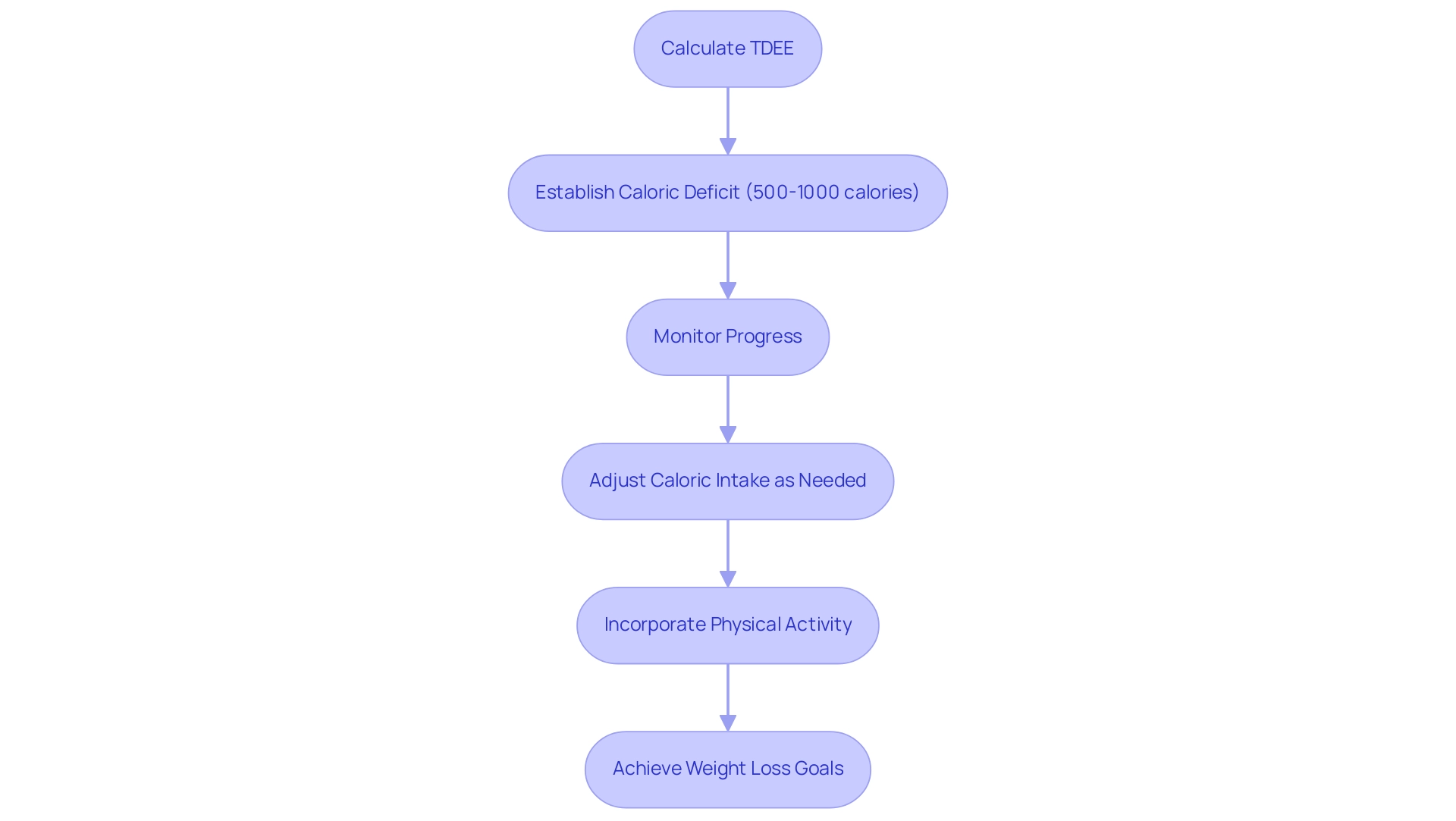
Nutritional Strategies for Effective Fat Loss
A balanced diet is essential for effective fat loss, particularly one that emphasizes whole foods such as fruits, vegetables, lean proteins, and healthy fats. These foods not only offer essential nutrients but also enhance overall wellness and well-being. Incorporating high-fiber foods into your meals can significantly enhance satiety, helping to reduce overall calorie intake.
Research shows that diets rich in fiber can result in increased sensations of fullness, which is essential for managing body mass in 2025.
To enhance these dietary approaches, tailored guidance from Corporate Membership can play a key part in achieving enduring lifestyle modifications. Experienced health coaches provide tailored support and guidance, helping individuals navigate their unique challenges and make informed choices that align with their health goals. Meal prepping is a practical strategy to combat impulsive eating and ensure that healthy options are readily available.
By planning meals in advance, individuals can avoid the temptation of unhealthy snacks and fast food. Additionally, practicing portion control by using smaller plates and being mindful of serving sizes can further aid in managing calorie consumption.
It is also vital to steer clear of processed foods and sugary drinks, which contribute to excess calorie intake without delivering nutritional benefits. Current statistics indicate that individuals who emphasize whole foods in their diets are more likely to attain and sustain a reduction of 20 lb of fat.
For example, research indicates that balanced diets lead to sustainable fat reduction, which can help individuals lose 20 lb of fat by supplying essential nutrients while maintaining calorie limits. The global industry for managing body mass is expected to reach a value of $423.2 billion by 2027, highlighting the importance of effective body management strategies in the current market. Moreover, as Kevin Hall, a physiologist, observed, the difficulties of sustaining reductions in body mass are clear, with participants from 'The Biggest Loser' facing a notable decline in their resting metabolic rate, resulting in regaining pounds years later.
This underscores the obstacles individuals encounter in long-term body management.
Additionally, the Global Action Plan for the Prevention and Control of NCDs offers a guiding framework for achieving wellness targets, emphasizing the significance of dietary changes in workplace wellness initiatives. Incorporating these nutritional strategies, alongside personalized coaching from Corporate Membership, not only supports weight loss goals but also fosters a healthier lifestyle overall. As specialists in the area highlight, an emphasis on whole foods and high-fiber choices, along with knowledgeable support, can result in enduring shifts in eating patterns, ultimately aiding in enhanced wellness outcomes.
Start your journey towards a better you by contacting us today!
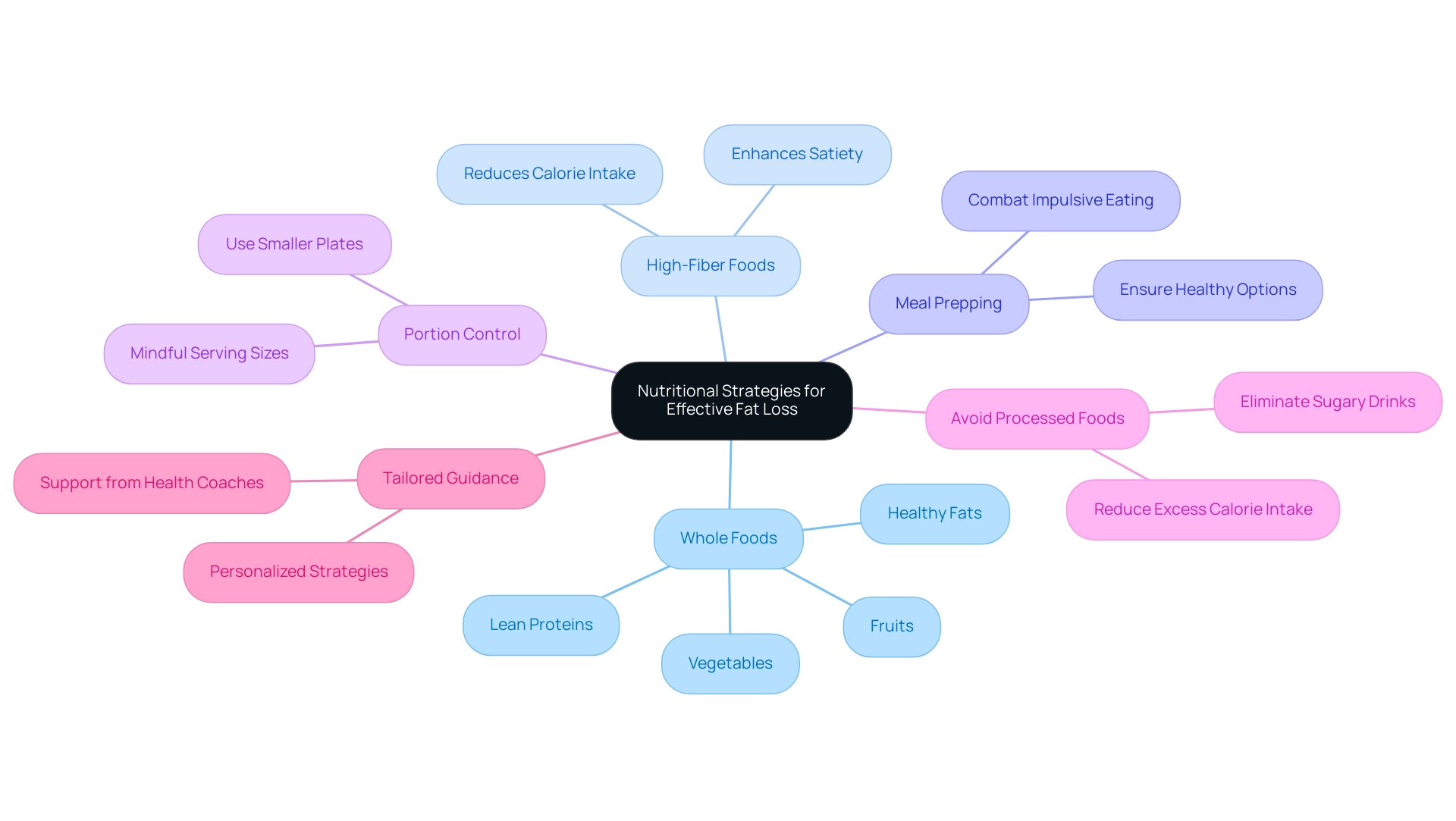
Incorporating Exercise into Your Weight Loss Plan
To effectively lose 20 lb of fat, it is essential to incorporate a balanced mix of cardiovascular and strength training activities into your routine. Current guidelines recommend aiming for at least 150 minutes of moderate-intensity aerobic activity each week. Activities such as brisk walking, cycling, or swimming not only enhance cardiovascular function but also significantly contribute to weight loss by burning calories and improving overall fitness.
In addition to aerobic exercises, integrating strength training at least twice a week is vital. Building muscle mass can significantly increase your resting metabolic rate, meaning you'll burn more calories even at rest. The Academy of Nutrition and Dietetics recommends consuming 0.35 grams of protein per pound of body weight to support muscle maintenance and overall health.
This dual approach not only assists in reducing 20 lb of fat but also enhances body composition and strength.
High-Intensity Interval Training (HIIT) has emerged as a particularly effective method for burning calories in a shorter amount of time. This training style alternates between intense bursts of activity and fixed periods of less-intense activity or complete rest. Research indicates that HIIT can lead to greater fat loss compared to traditional steady-state cardio, making it a valuable addition to your workout routine.
Mark Hyman, a fitness expert, emphasizes that "maintaining muscle mass and keeping your metabolism high is crucial for weight maintenance." Discovering activities you truly enjoy is essential for integrating physical activity into your lifestyle. Whether it’s dancing, hiking, or group fitness classes, engaging in enjoyable activities can enhance motivation and adherence to your fitness goals.
Foresight Coaching provides customized wellness services aimed at assisting individuals and corporate teams in reaching their fitness objectives. Our corporate membership includes in-person wellness talks, comprehensive pantry and nutrition services, and white-glove service, all aimed at fostering a healthier workplace environment. By adopting a comprehensive exercise routine that includes both cardio and strength training, you can effectively work towards your weight loss goals while fostering a healthier, more active lifestyle.
Our tailored wellness programs boost employee performance and motivation, facilitating teams in reaching their wellness objectives.
For HR Benefits Managers aiming to enhance employee well-being, we invite you to reach out to Foresight Health Coaching to discover more about our services and how we can assist your organization in flourishing.
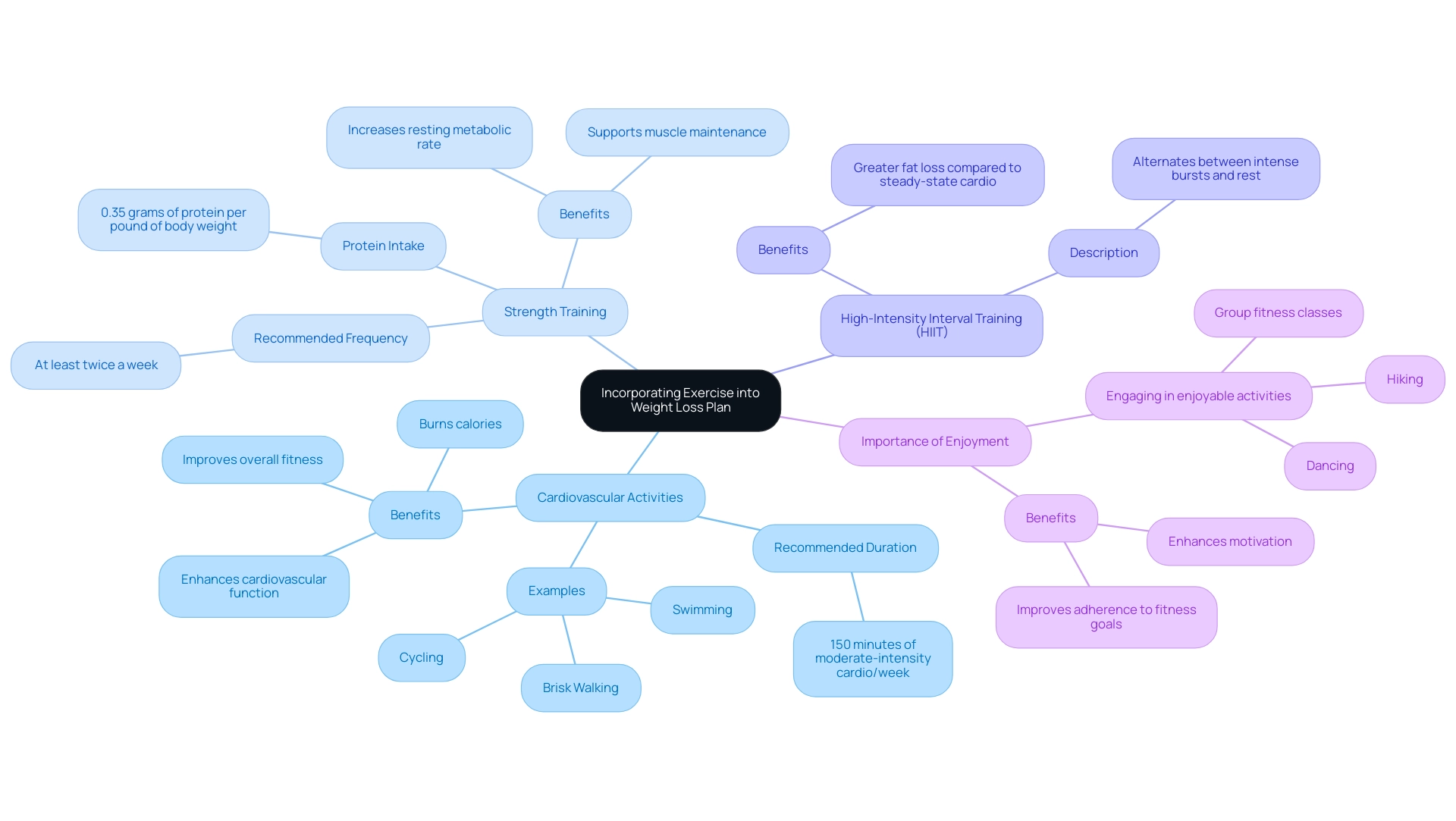
Cultivating a Positive Mindset for Sustainable Weight Loss
Fostering a positive mindset is crucial for attaining lasting fitness results, particularly in a corporate setting where health and productivity are interconnected. Start by establishing realistic and attainable goals that prioritize progress over perfection. This approach not only fosters a sense of accomplishment but also helps maintain motivation throughout the journey.
Embrace self-compassion, acknowledging that setbacks are a natural part of the process, and use them as learning opportunities rather than reasons for discouragement.
Studies suggest that individuals who establish specific, attainable objectives are more likely to achieve favorable results in their journey towards a healthier body. In 2025, the emphasis on mindset has become increasingly recognized, with studies showing that a positive outlook correlates with greater success in weight loss endeavors. For instance, individuals who sustain a constructive mindset are more likely to adhere to their fitness routines and dietary plans, ultimately resulting in better outcomes.
Incorporating regular physical activity into your routine can significantly enhance motivation. Statistics indicate that employees who exercise for at least 30 minutes three times per week are more likely to report feeling motivated at work. This motivation not only aids in personal weight loss goals but also contributes to a healthier workplace culture, reducing absenteeism and fostering a cohesive team environment.
Personalized coaching from experienced professionals at Corporate Membership can further amplify these efforts. Our wellness coaches provide tailored support and guidance, utilizing evidence-based techniques to help individuals make lasting lifestyle changes. By focusing on personalized strategies, we empower employees to take control of their health and well-being, enhancing their overall motivation and commitment to their goals.
Testimonials from our satisfied clients emphasize the effectiveness of our method: "Thanks to Corporate Membership, I not only reduced my size but also gained the confidence to maintain a healthier lifestyle!" Visualization methods can be effective instruments in strengthening your dedication to your fitness goals. By vividly imagining your success, you create a mental roadmap that can guide your actions and decisions.
Additionally, surrounding yourself with supportive individuals—whether friends, family, or colleagues—can significantly enhance your motivation. Participating in a fitness group or community can offer a sense of responsibility and support, further enhancing your efforts.
Expert advice underscores the importance of mindset in weight loss. Psychologists emphasize that a positive attitude not only enhances motivation but also influences behavior change. Sam Phoenix, founder of Great Green Wall, believes that a healthy lifestyle is vital to a happy and fulfilling life, emphasizing the significance of incorporating wellness into daily routines.
Real-world examples abound, showcasing individuals who have transformed their lives by adopting a positive mindset and setting achievable goals.
Moreover, technology plays a vital role in supporting wellness journeys. Fitness apps in 2025 offer personalized tracking and guidance, helping users maintain consistency and confidence in their health goals. By concentrating on these strategies and utilizing the corporate wellness programs provided by Corporate Membership, you can establish a strong foundation for your journey towards a healthier lifestyle, paving the way for enduring success.
Contact us today to initiate your journey towards a healthier you!
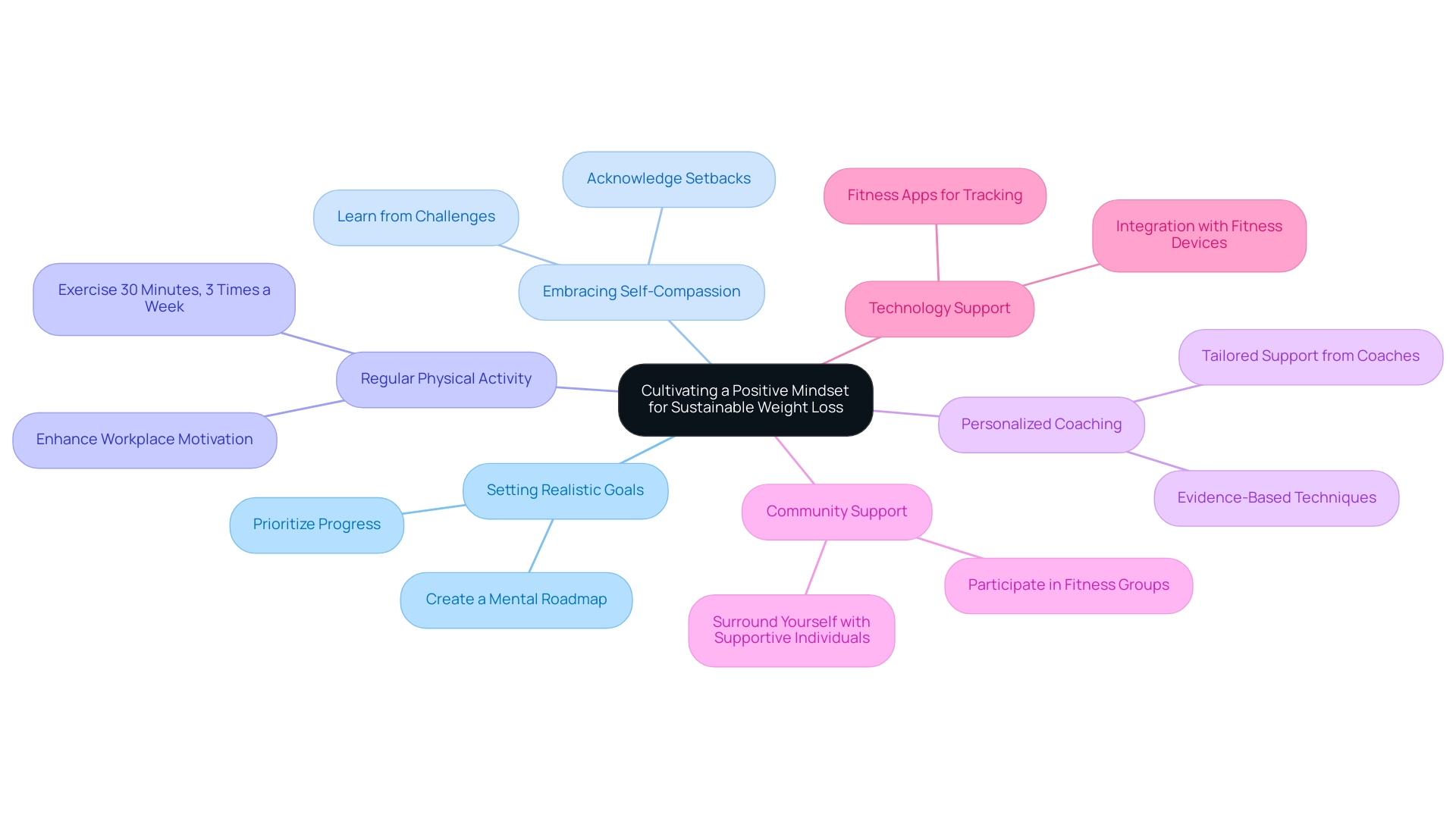
Monitoring Progress and Adjusting Your Weight Loss Strategy
To effectively oversee your reduction progress, it is essential to consistently log your food consumption, workout routines, and body fluctuations. Utilizing apps or maintaining a journal can significantly aid in logging meals and workouts, allowing you to identify patterns and areas that may require adjustment. If you experience a reduction plateau, it might be time to reevaluate your caloric consumption and fitness routine.
Research indicates that regular exercise is linked to reduced fatigue and improved mood, which can enhance your overall motivation and engagement in your weight loss journey. Furthermore, Foresight Health Coaching's corporate partnership offers organizations a pathway to foster a healthier team culture, beneficial for individuals on their weight loss journey. Their comprehensive wellness coaching services include tailored programs for both individuals and corporate groups, focusing on fitness, nutrition, and wellness workshops. Specific offerings of the corporate membership include in-person wellness talks, comprehensive pantry and nutrition services, white-glove service, and access to their health and wellness app.
Adjusting your goals periodically is crucial, as it helps maintain momentum and keeps your efforts aligned with your evolving needs. Seeking professional guidance from a nutritionist or personal trainer can provide tailored strategies to optimize your approach. For example, environmental management approaches have demonstrated potential in encouraging healthier eating and physical activity, which can be crucial in addressing challenges related to reducing body mass.
By adjusting your environment to make healthier choices more reachable, you can encourage sustainable habits that aid in effective management of body mass.
In 2025, monitoring loss progress involves not only tracking metrics but also understanding the psychological aspects of management. As Andy Morgan notes, it can be a slippery slope mentally if you tell yourself you can 'fix' things the next day. Interacting with technology, like fitness applications, can simplify this process, providing insights into your dietary habits and activity patterns.
Additionally, the National Institute of Diabetes and Digestive and Kidney Diseases provides a body weight planner that can help create personalized eating and exercise plans. Remember, the journey to losing 20 lb of fat is not just about the numbers; it's about creating a balanced lifestyle that supports your long-term health and well-being.
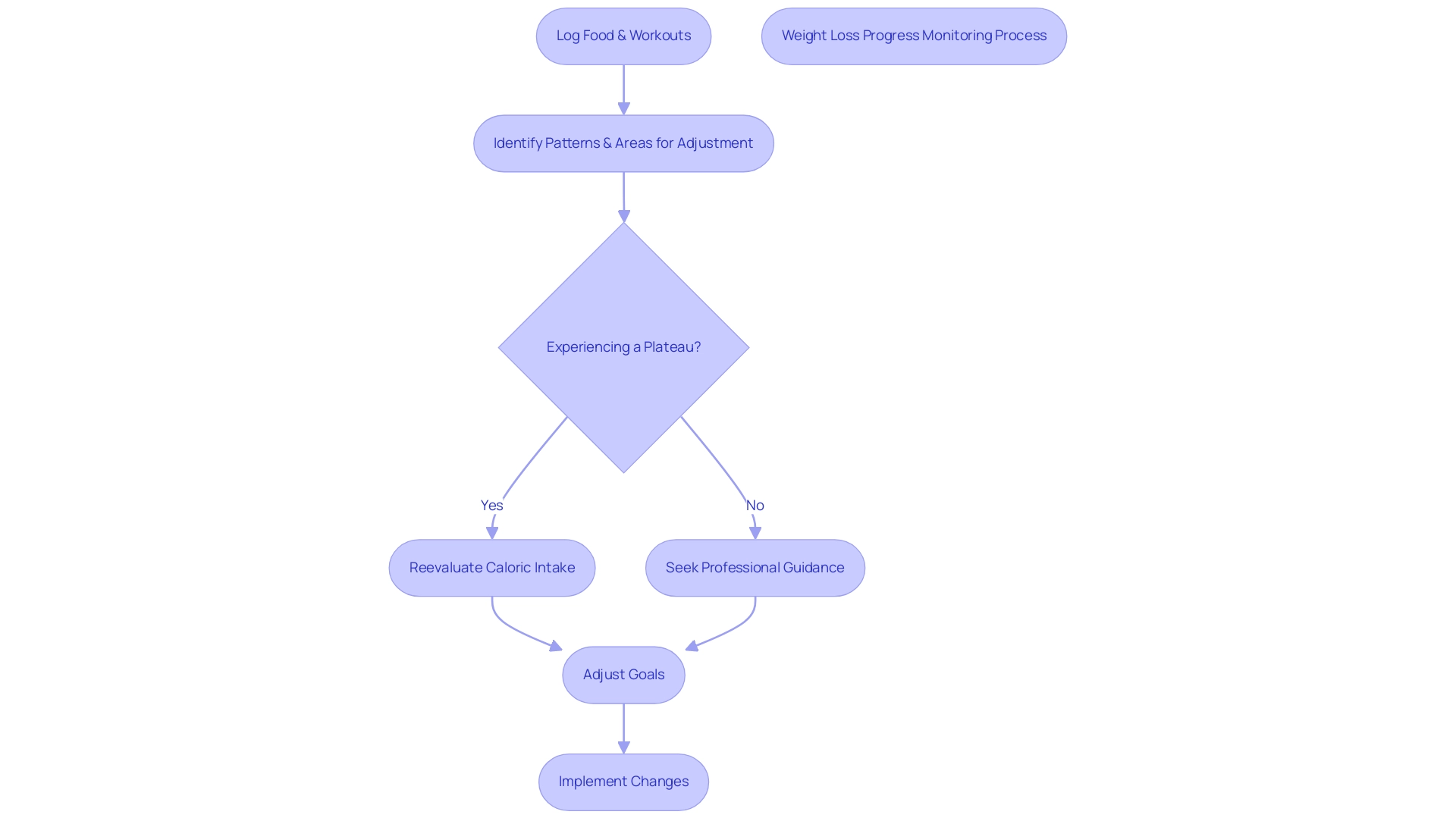
Conclusion
Achieving effective fat loss is a journey that intertwines dietary strategies, exercise, and a positive mindset. Emphasizing the importance of maintaining a caloric deficit is crucial, as it sets the foundation for weight loss by ensuring that the body utilizes stored fat for energy. Coupled with a balanced diet rich in whole foods and regular physical activity, individuals can create a sustainable path toward their weight loss goals. Tailored coaching and wellness programs further enhance this journey, providing the necessary support and accountability to foster healthier habits.
Incorporating a variety of exercises, including cardiovascular and strength training, not only aids in fat loss but also improves overall fitness and boosts metabolism. A comprehensive approach that balances these elements will yield the best results in both weight loss and overall health. Furthermore, cultivating a positive mindset can greatly influence motivation and adherence to weight loss plans, making it essential to set realistic goals and celebrate progress along the way.
Ultimately, the combination of understanding caloric needs, engaging in enjoyable physical activities, and fostering a supportive environment through coaching and corporate wellness programs creates a robust framework for successful and sustainable weight management. By prioritizing these principles, individuals can not only achieve their weight loss objectives but also enhance their overall well-being, leading to a healthier, more fulfilling life.
Frequently Asked Questions
What is fat reduction and how does it occur?
Fat reduction occurs when the body uses its stored fat reserves for energy, primarily driven by maintaining a caloric deficit, which is achieved by consuming fewer calories than the body expends.
What key elements affect fat reduction?
Key elements affecting fat reduction include metabolism, hormonal balance, and lifestyle decisions.
How can I evaluate my current status for a fat loss plan?
Begin by evaluating your current mass, body composition, and lifestyle habits to identify areas for enhancement. Keeping a food diary can help track caloric intake and eating patterns.
What are the recommended guidelines for physical activity to aid fat reduction?
Current guidelines recommend adults engage in 150 to 300 minutes of moderate-intensity exercise or 75 to 150 minutes of vigorous-intensity exercise weekly.
How much caloric deficit is recommended for sustainable fat loss?
Creating a caloric deficit of approximately 500 calories per day can lead to a sustainable reduction of about 20 lb of fat over time, averaging 1 to 2 pounds per week.
Why is hormonal balance important in fat reduction?
Hormonal balance is significant because it influences how metabolism interacts with hormonal levels, affecting results in reducing body mass.
What role does Foresight Health Coaching play in achieving fat reduction goals?
Foresight Health Coaching offers tailored fitness coaching, wellness workshops, and personalized coaching services to help individuals meet activity guidelines and implement changes effectively.
What additional services does Foresight Health Coaching provide for organizations?
Foresight Health Coaching offers corporate memberships that include wellness talks, pantry and nutrition services, and access to a health and wellness app to foster a healthy workplace environment.
How can I calculate my Total Daily Energy Expenditure (TDEE)?
You can compute your TDEE using an online calculator that factors in your age, mass, height, and activity level, representing the total calories your body requires to maintain its current mass.
What should I do if my TDEE changes?
Regular monitoring of your TDEE is essential, as it can fluctuate based on changes in diet, physical activity, and body composition. Be prepared to modify your caloric consumption as needed to stay aligned with your reduction objectives.

